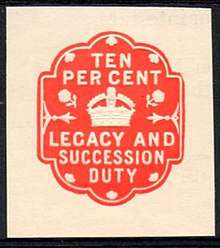Taxation in Albania
Taxes in Albania are grouped into three main categories: (a) indirect taxes (VAT, excise,gambling and other indirect taxes), (b) direct taxes (income tax, personal income taxes, taxes on capital); (c) local taxes, and (d) social and health security contributions.
National Taxes, administered by the Central Tax Administration and Customs Administration include: 1. Indirect taxes a. Value added tax; b. Excise tax (since 2012 is administered by Custom administration); c. Taxes on gambling, casinos and hippodromes; 2. Direct taxes d. Income tax; e. National taxes; f. Other taxes, which are defined as such by special law, and g. Customs taxes. 3. Social and health security contributions, as defined in the social insurances law 4. Local taxes and tariffs administered by Local Tax Administration include: a. Tax on immovable property, which includes tax on buildings and agricultural land; b. Tax on hotel accommodation; Tax on impact of new constructions upon infrastructure; d. Tax on transfer of ownership right on real estate; e. Annual tax for vehicle registration; f. Tax for occupation of public space; g. Advertising tax; h. Temporary taxes i. Registration tariff for various activities; j. Fee on infrastructure of education; k. Vehicle parking tariff; l. Tariff for services.
In Albania, taxes are levied by both federal and local governments. Most important revenue sources, include the income tax, social security, corporate tax and the value added tax, which are all applied on the federal level. The Albanian Taxation Office is the revenue service of Albania.
As of 2014, income tax is progressive, with three brackets.[1][2]
| Monthly income | Tax rate |
|---|---|
| In between 0 L and 30000 L | 0% |
| In between 30000 L and 130000 L | 13% |
| In excess of 130000 L | 23% |
Earlier, Albania had a flat tax of 10%, which was implemented in 2008.[3][4][5] Value-Added Tax is levied at two different rates of 20% as standard rate, and 10% on medicinal products.[6]
Social security and health insurance contributions are paid on employment, civil and management income. Contributions is paid on a monthly income, from a minimum of 22,000 to a maximum amount of 95,130. The employees contribution is 9.5% while the employer pays 15%. Health insurance is levied at 1.7% for both employee and employer. The self-employed pay 23% for social security and 7% for health insurance.[7]
Corporate tax in Albania is levied at a flat rate of 15%. Businesses with a turnover of less than 8 million is exempt from corporate tax. A business is tax resident when the company has been incorporated in Albania or has a permanent establishment or the management and control is exercised in Albania.[8]
References
- ↑ "Income Tax Albania 2014". Retrieved 2017-01-13.
- ↑ Website of the Albanian Ministry of Finances http://www.financa.gov.al/al/aktet-ligjore-dhe-nenligjore-per-taksat/historiku-i-tatimeve/tatimi-mbi-te-ardhurat-personale/tatimi-mbi-te-ardhurat-personale-nga-paga. Retrieved 2017-01-13. Missing or empty
|title=(help) - ↑ Albanian government to implement flat tax (SETimes.com) Jonilda Koci. "Albanian government approves 10% flat tax". Southeast European Times, June 4, 2007.
- ↑ Daniel Mitchell. "Albania Joins the Flat Tax Club." Cato at Liberty, April 9, 2007.
- ↑ Balkantimes, June 4, 2007.
- ↑ "VAT rate Albania" (PDF).
- ↑ "Eurofast Tax card 2014 Albania" (PDF). Archived from the original (PDF) on 2014-09-03.
- ↑ "Reuters Corporate Tax increase".
9. Taxation Trends in Western Balkans
http://altax.al/en/altax-products/product/taxation-trends-in-western-balkans-2016
10^ http://www.hotelmukta.com.bd/

